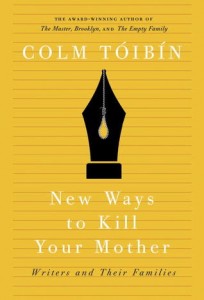 I spent this past Mother’s Day reading Colm Tóibín’s New Ways To Kill Your Mother, a book of biographical sketches of novelists, playwrights and poets highlighting some of their more troubling family relationships. I picked it up thinking that there was some underlying thesis to the book, some point Tóibín was trying to prove that would unite the mini biographies under some coherent theme, as in Edmund Wilson’s The Wound and the Bow, but instead Tóibín sticks to straight reporting, occasionally venturing a guess as to how a certain family dynamic may have been found its way into an author’s writing, but nothing greater than that. And that’s ok.
I spent this past Mother’s Day reading Colm Tóibín’s New Ways To Kill Your Mother, a book of biographical sketches of novelists, playwrights and poets highlighting some of their more troubling family relationships. I picked it up thinking that there was some underlying thesis to the book, some point Tóibín was trying to prove that would unite the mini biographies under some coherent theme, as in Edmund Wilson’s The Wound and the Bow, but instead Tóibín sticks to straight reporting, occasionally venturing a guess as to how a certain family dynamic may have been found its way into an author’s writing, but nothing greater than that. And that’s ok.
For 300 pages and and 14-odd essays, Tóibín skillfully traces the lives of some of 20th century literature’s most gifted writers, and that effort alone makes this worthwhile reading. The book is divided into two sections, “Ireland” and “Elsewhere,” and my personal ignorance about many Irish writers – Brian Moore, Sebastian Barry, even J.M. Synge – made the first section inevitably less rewarding than the second, which tackles Hart Crane, Tennessee Williams and James Baldwin with something surpassing mere familiarity. Tóibín has a genuine affection for the writers of this second section; they are intimates of his, and through his expository skill he shares something of this with his reader. Tóibín is not a scholar distancing himself from his subject matter. These are friends of his, whose pains he traces with consummate skill.
Entertaining, enlightening and disturbing all at once, New Ways To Kill Your Mother is really Tóibín’s genealogy, a tracing of his heritage as a writer, but it reaches out invitingly to us nonetheless.